-
REVIEW05-13-2024
Technologies used in the treatment of burn victims in intensive care: a scope review
Revista Brasileira de Enfermagem. 2024;77(1):e20220738
Abstract
REVIEWTechnologies used in the treatment of burn victims in intensive care: a scope review
Revista Brasileira de Enfermagem. 2024;77(1):e20220738
DOI 10.1590/0034-7167-2022-0738
Views0See moreABSTRACT
Objectives:
to analyze the technologies used by the nursing team in the treatment of skin lesions caused by burns in patients under intensive care.
Methods:
this is a scope review conducted on the LILACS, Medline, PubMed, and CINAHL databases without temporal or language restrictions.
Results:
the highlighted technologies included the use of specialized dressings, biological agents such as probiotics and cyanobacteria, as well as negative pressure therapies and enzymes such as papain and collagenase. Some technologies, such as nanocrystalline silver, demonstrated efficacy in infection control.
Final Considerations:
the study identified essential technologies in burn care, emphasizing the need for further research on “soft” technologies. The findings support the promotion of evidence-based nursing care for burn patients in intensive care and enhance knowledge about effective treatments.
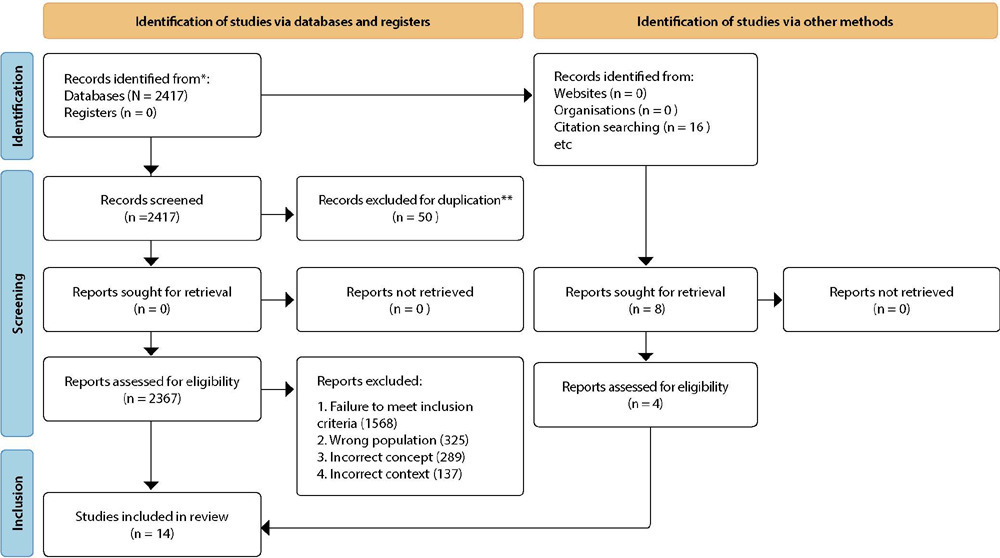
-
ORIGINAL ARTICLE05-03-2024
Cancer patient satisfaction regarding the quality of information received: psychometric validity of EORTC QLQ-INFO25
Revista Brasileira de Enfermagem. 2024;77(1):e20230358
Abstract
ORIGINAL ARTICLECancer patient satisfaction regarding the quality of information received: psychometric validity of EORTC QLQ-INFO25
Revista Brasileira de Enfermagem. 2024;77(1):e20230358
DOI 10.1590/0034-7167-2023-0358
Views0See moreABSTRACT
Objectives:
to psychometrically validate the European Organization for Research and Treatment of Cancer Core Quality of Life Questionnaire EORTC QLQ-INFO25 instrument and identify the domains that influence patients’ perception of the information received.
Methods:
a cross-sectional methodology with cancer patients in a Brazilian philanthropic hospital institution. Sociodemographic and clinical instruments, EORTC QLQ-C30, EORTC QLQ-INFO25 and Supportive Care Needs Survey – Short Form 34 were used. Analysis occurred using Cronbach’s alpha coefficients, intraclass correlation, test-retest and exploratory factor analysis.
Results:
128 respondents participated. Cronbach’s alpha coefficient was 0.85. The test-retest obtained p-value=0.21. In the factor analysis, one item was excluded. Satisfaction with the information received was 74%, with three areas with averages below 70%. In open-ended questions, there was a greater desire for information.
Conclusions:
validity evidence was obtained with instrument reliability, consistency and stability. Respondents expressed satisfaction with the information received.
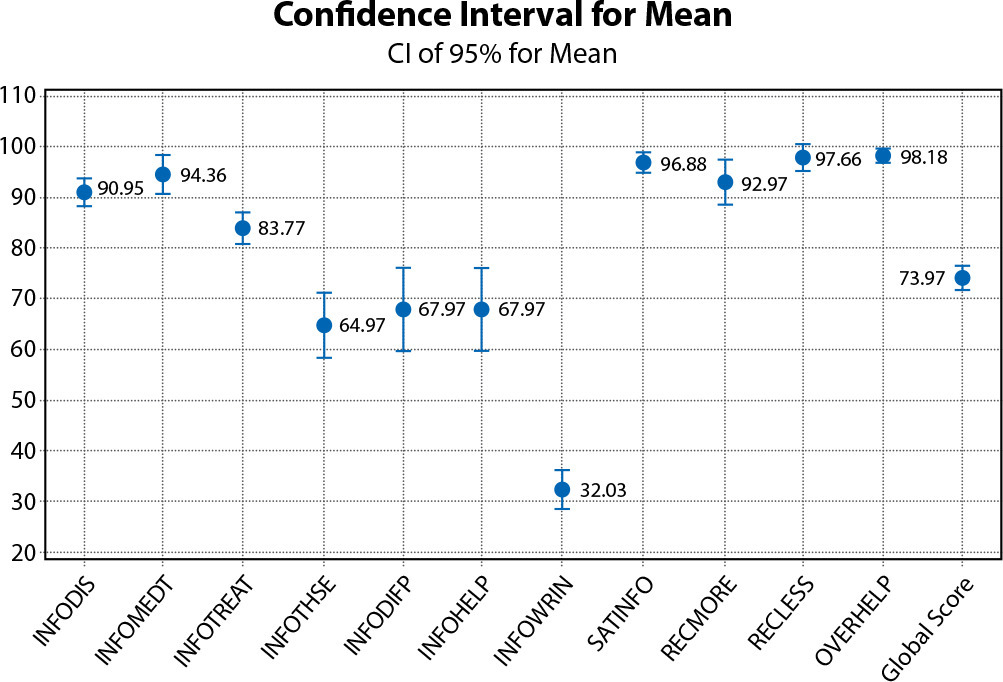
-
05-03-2024
Intervenções de Enfermagem para capacitar o cuidador familiar de uma pessoa com amputação de membro inferior: revisão de escopo
Revista Brasileira de Enfermagem. 2024;77(1):e20230264
Abstract
Intervenções de Enfermagem para capacitar o cuidador familiar de uma pessoa com amputação de membro inferior: revisão de escopo
Revista Brasileira de Enfermagem. 2024;77(1):e20230264
DOI 10.1590/0034-7167-2023-0264
Views0See moreRESUMEN
Objetivos:
mapear intervenciones de enfermería que capaciten al cuidador familiar de la persona con amputación de miembro inferior para su rol.
Métodos:
es una revisión de alcance guiada por la metodología del Instituto Joanna Briggs, llevada a cabo en diferentes bases de datos (incluyendo literatura gris).
Resultados:
se tuvieron en cuenta seis estudios publicados entre 2009 y 2021, a saber: intervenciones de asesoramiento y apoyo para pacientes y familiares; intervenciones de apoyo entre iguales realizadas por un par de profesionales certificados; participación de cuidadores o familiares en grupos de apoyo e intervenciones clave para el equilibrio psicológico del paciente y del cuidador familiar. Dos estudios analizaron la importancia de la formación del cuidador y del amputado y del desarrollo de habilidades de afrontamiento. Otro estudio recomendó intervenciones de apoyo informativo para los cuidadores en relación con el cuidado del amputado y su adaptación a la vida hogareña.
Conclusiones:
los resultados de esta revisión permiten identificar recomendaciones/directrices para la práctica y recomendaciones/sugerencias de intervenciones según las necesidades identificadas de los cuidadores familiares de pacientes con amputación de miembros inferiores.
-
REVIEW05-03-2024
Nursing interventions to empower the family caregiver of person with lower limb amputation: scoping review
Revista Brasileira de Enfermagem. 2024;77(1):e20230264
Abstract
REVIEWNursing interventions to empower the family caregiver of person with lower limb amputation: scoping review
Revista Brasileira de Enfermagem. 2024;77(1):e20230264
DOI 10.1590/0034-7167-2023-0264
Views0See moreABSTRACT
Objectives:
to map nursing interventions that empower the Family caregiver of the person with lower limb amputation for is role.
Methods:
scoping review guided by Joanna Briggs Institute methodology conducted in different databases (including gray literature).
Results:
six studies published between 2009 and 2021 were included. Interventions of counselling and support for patients and family; peer support interventions performed by a certified pair; involvement of caregivers or family members in support groups; and key interventions for patient and family caregiver psychological balance. Two studies discussed the importance of caregiver and amputee training and development of coping skills. Another study recommended Interventions of informative support for caregivers regarding care for the amputee and adaptation to home.
Conclusions:
results of this review allow the identification of recommendations (guidelines) for practice and recommendations/suggestions for interventions according with identified needs of family caregivers of patients with lower limb amputation.
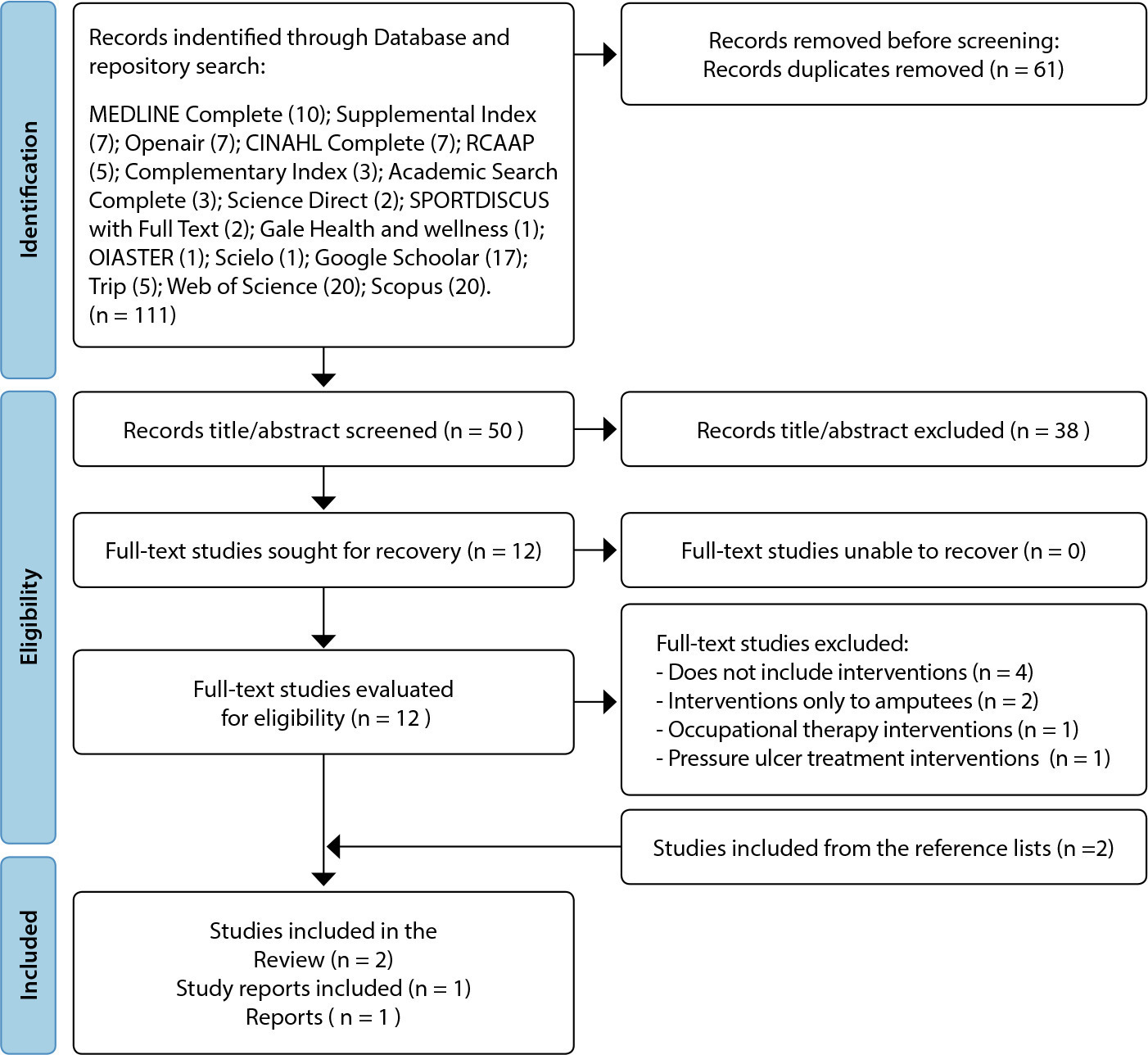
-
ORIGINAL ARTICLE05-03-2024
Pregnancy loss in women with systemic lupus erythematosus: Grounded Theory
Revista Brasileira de Enfermagem. 2024;77(1):e20230225
Abstract
ORIGINAL ARTICLEPregnancy loss in women with systemic lupus erythematosus: Grounded Theory
Revista Brasileira de Enfermagem. 2024;77(1):e20230225
DOI 10.1590/0034-7167-2023-0225
Views0See moreABSTRACT
Objective:
to learn the meanings attributed to pregnancy loss by women with Lupus.
Method:
qualitative research, based on Symbolic Interactionism and Grounded Theory. Data collection took place between January and August 2022 through in-depth interviews. Data analysis went through the stages of initial and focused coding.
Results:
seventeen women participated. The central phenomenon “The climb to motherhood: falls and overcoming” was constructed, consisting of three categories: “Falling to the ground during the climb: the experience of pregnancy loss”; “Getting up and following the path: new attempts to conceive”; and “Remembering the journey: meanings attributed to pregnancy losses”.
Final considerations:
experiencing pregnancy is, analogously, like climbing a mountain, where obstacles need to be overcome to reach the summit. The experience of pregnancy loss is seen as complex, especially when there is fragility in healthcare and a lack of awareness regarding feelings of loss and grief.
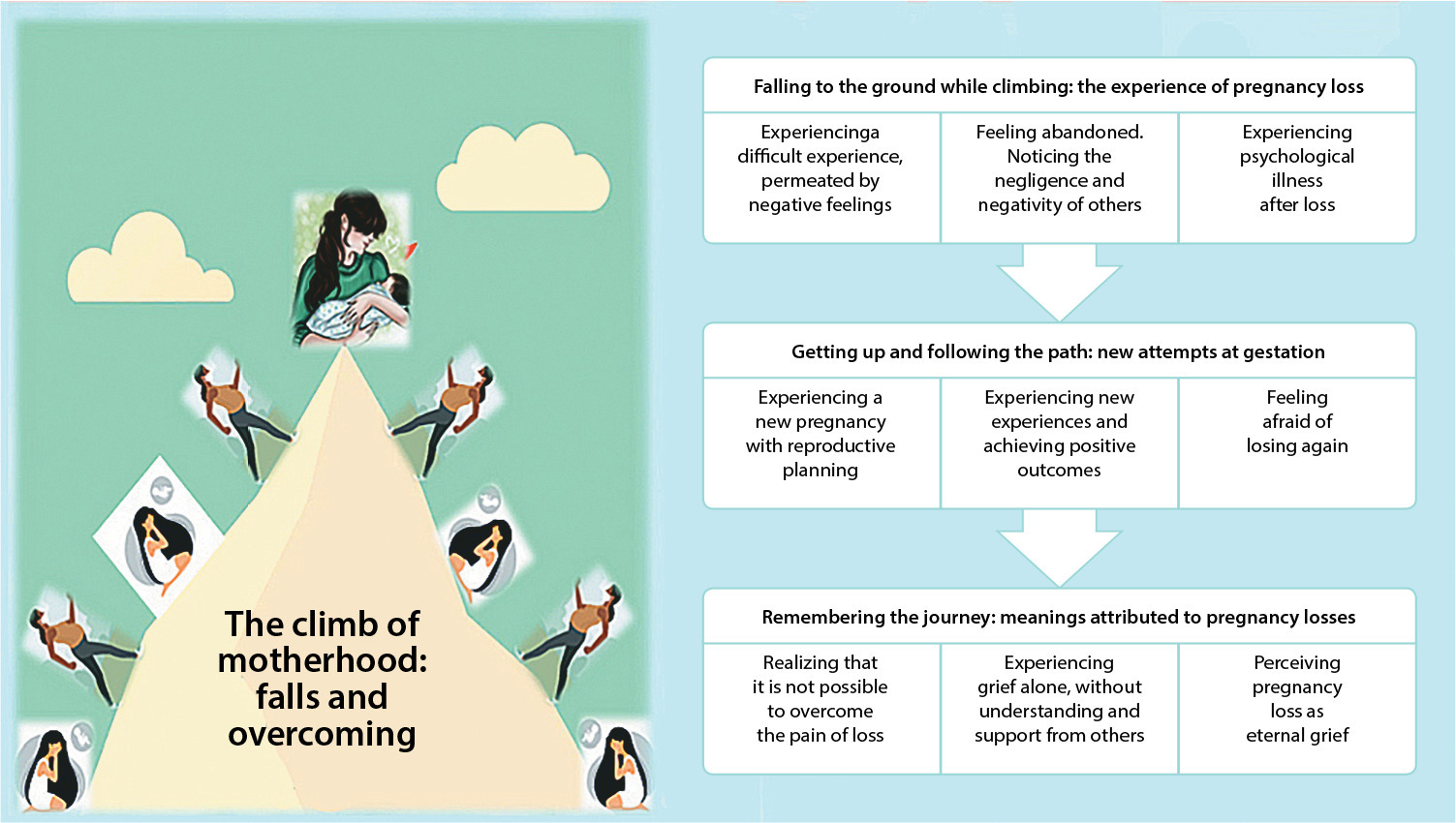
-
ORIGINAL ARTICLE05-03-2024
Josicélia Dumêt Fernandes’ professional trajectory: contributions to psychiatric and mental health nursing
Revista Brasileira de Enfermagem. 2024;77(1):e20230174
Abstract
ORIGINAL ARTICLEJosicélia Dumêt Fernandes’ professional trajectory: contributions to psychiatric and mental health nursing
Revista Brasileira de Enfermagem. 2024;77(1):e20230174
DOI 10.1590/0034-7167-2023-0174
Views0See moreABSTRACT
Objectives:
to analyze nurse Josicélia Dumêt Fernandes’ life story, with emphasis on her work in the psychiatry and mental health fields.
Methods:
historical, qualitative research. Semi-structured interviews and documentary research were used as data collection techniques, collected from September to October 2021. For data analysis, we opted for the content analysis method and comparison with the Foucauldian philosophical framework.
Results:
four categories emerged: Transforming herself and mental health practices; (Re)framing professional practice; Nursing practice and power relations; and The paths and implications in the psychiatry and mental health fields.
Final Considerations:
the study of the biographer demonstrates a search for transformation of herself and mental health practices, with a rupture in paradigms and reframing of her practice in psychiatry and mental health.
-
05-03-2024
Propiedades psicométricas de la versión chilena del cuestionario de calidad de vida para mieloma múltiple
Revista Brasileira de Enfermagem. 2024;77(1):e20230100
Abstract
Propiedades psicométricas de la versión chilena del cuestionario de calidad de vida para mieloma múltiple
Revista Brasileira de Enfermagem. 2024;77(1):e20230100
DOI 10.1590/0034-7167-2023-0100es
Views0See moreRESUMEN
Objetivos:
Evaluar consistencia interna y validez de constructo del QLQ-MY20 para valoración de calidad de vida en sobrevivientes de mieloma múltiple en Chile.
Métodos:
Estudio transversal, realizado entre marzo 2020 y diciembre 2022. Participaron 118 personas de dos hospitales públicos. Se utilizaron los cuestionarios QLQ-C30 y QLQ-MY20. Fueron evaluadas la consistencia interna con alfa de Cronbach (α) y validez de constructo mediante pruebas de hipótesis (Mann Whitney y correlación de Spearman).
Resultados:
El promedio de edad de los participantes era 67,2 (DE=9,2) años. Consistencia interna para escala completa (α=0,779), dimensión “síntomas de la enfermedad” (α=0,671), dimensión “efectos secundarios de los tratamientos” (α=0,538) y dimensión “perspectiva de futuro” (α=0,670). Se comprobaron cuatro de las cinco hipótesis de la validez de constructo: presentaron más síntomas las mujeres, personas con peor performance estatus, con dolor y con peor fatiga.
Conclusiones:
La versión chilena del QLQ-MY20 presenta adecuada consistencia interna y validez de constructo.
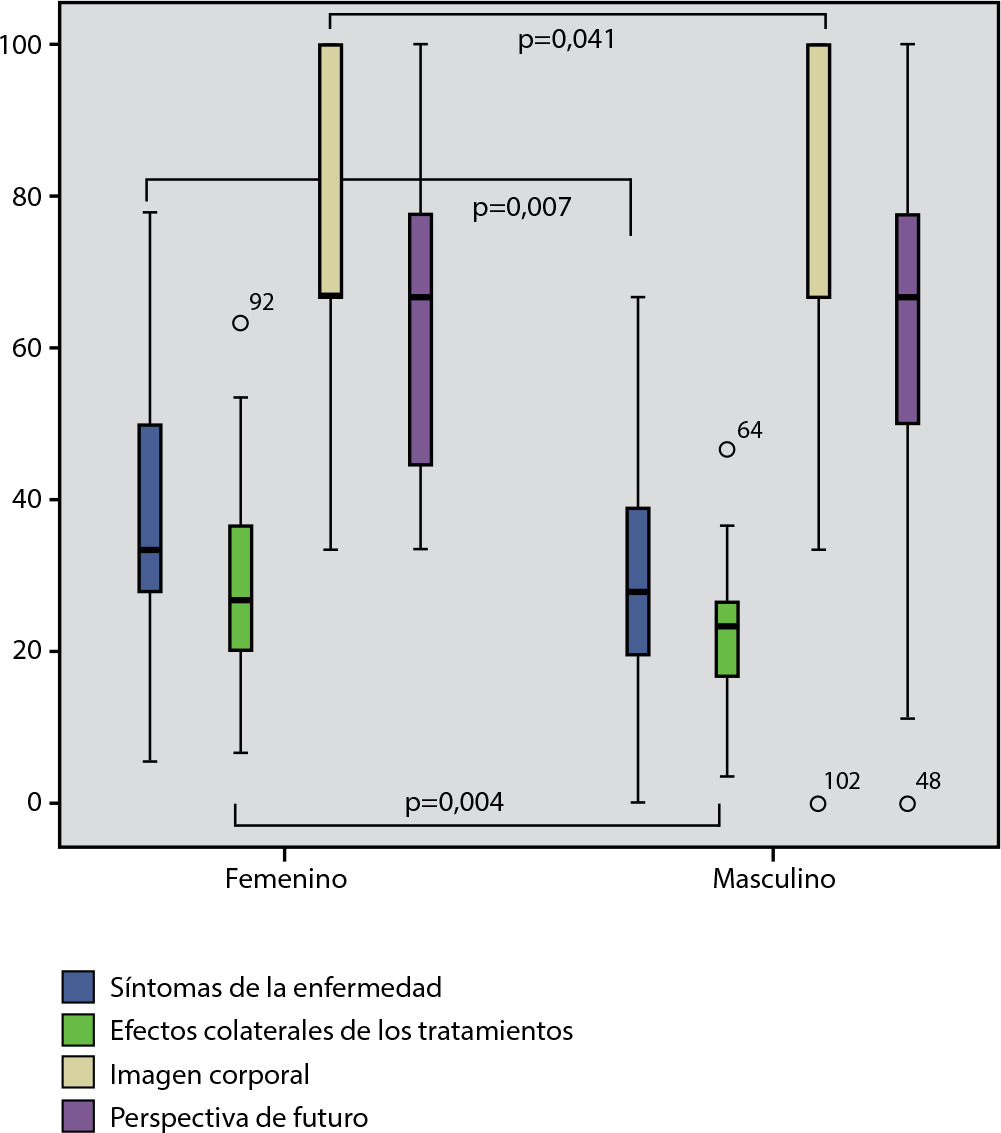
-
ORIGINAL ARTICLE05-03-2024
Psychometric properties of the Chilean version of the quality of life questionnaire for multiple myeloma
Revista Brasileira de Enfermagem. 2024;77(1):e20230100
Abstract
ORIGINAL ARTICLEPsychometric properties of the Chilean version of the quality of life questionnaire for multiple myeloma
Revista Brasileira de Enfermagem. 2024;77(1):e20230100
DOI 10.1590/0034-7167-2023-0100
Views0See moreABSTRACT
Objectives:
To evaluate the internal consistency and construct validity of the QLQ-MY20 for assessing the quality of life in multiple myeloma survivors in Chile.
Methods:
This was a cross-sectional study conducted between March 2020 and December 2022. It involved 118 individuals from two public hospitals. The QLQ-C30 and QLQ-MY20 questionnaires were used. Internal consistency was assessed using Cronbach’s alpha(α), and construct validity was evaluated through hypothesis testing (Mann-Whitney and Spearman correlation).
Results:
The average age of participants was 67.2 years (SD=9.2). Internal consistency for the complete scale was α=0.779, for the “disease symptoms” dimension α=0.671, for the “side effects of treatments” dimension α=0.538, and for the “future perspective” dimension α=0.670. Four of the five construct validity hypotheses were confirmed: women, individuals with worse performance status, those with pain, and those with worse fatigue showed more symptoms.
Conclusions:
The Chilean version of the QLQ-MY20 demonstrates adequate internal consistency and construct validity.
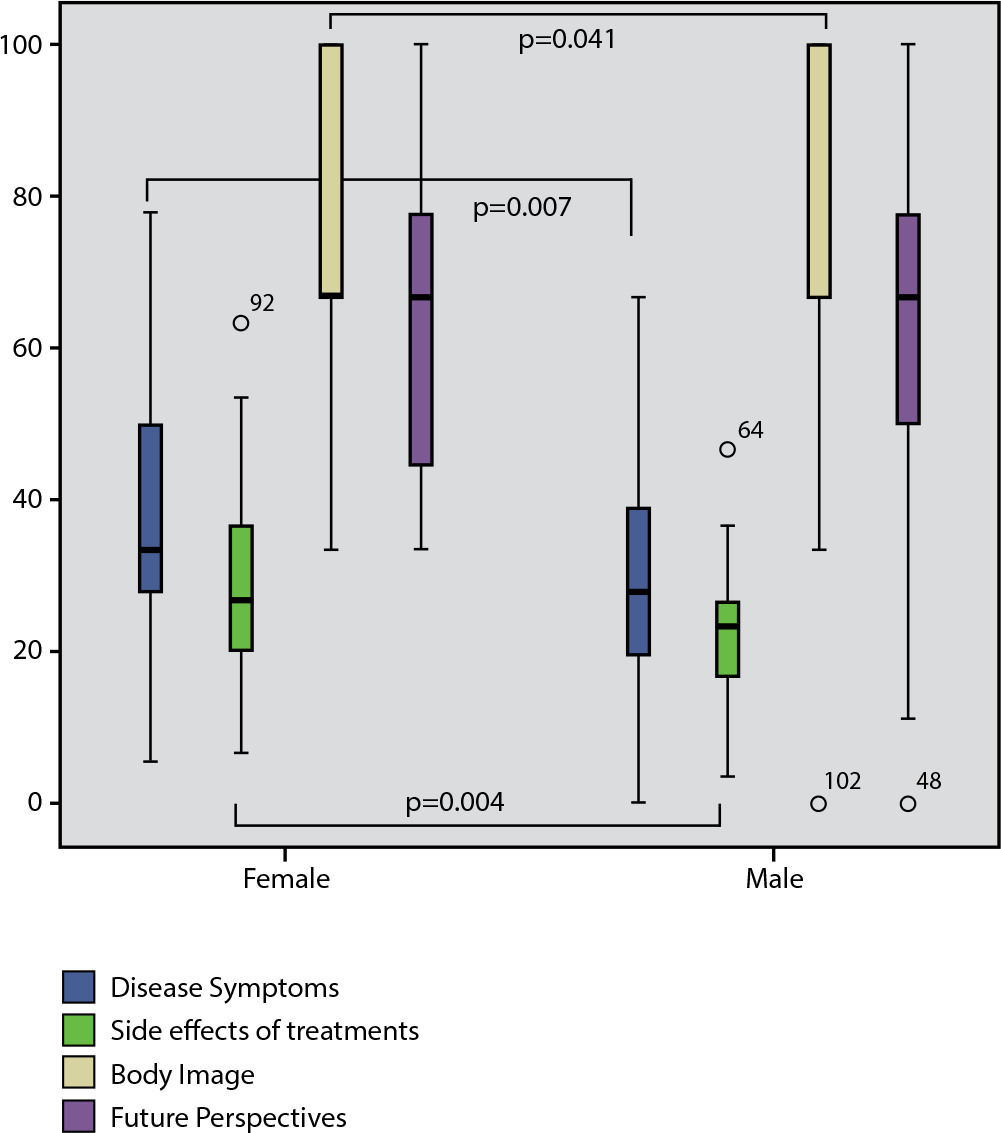
-
03-08-2024
A enfermagem como protagonista no enfrentamento da hesitação e recusa vacinal
Revista Brasileira de Enfermagem. 2024;77:e77suppl101
Abstract
A enfermagem como protagonista no enfrentamento da hesitação e recusa vacinal
Revista Brasileira de Enfermagem. 2024;77:e77suppl101
DOI 10.1590/0034-7167.202477suppl101pt
Views0Desde a década de 1970, o Ministério da Saúde do Brasil instituiu o Programa Nacional de Imunização (PNI), que precedeu o Sistema Único de Saúde e que lhe foi incorporado e fortalecido, devido ao modelo descentralizado aos municípios, mas de comando único ao nível central. Seu objetivo era e ainda é coordenar as ações de […]See more -
03-08-2024
Nursing as a player in tackling vaccine hesitancy and refusal
Revista Brasileira de Enfermagem. 2024;77:e77suppl101
Abstract
Nursing as a player in tackling vaccine hesitancy and refusal
Revista Brasileira de Enfermagem. 2024;77:e77suppl101
DOI 10.1590/0034-7167.202477suppl101
Views1Since the 1970s, the Brazilian Ministry of Health established the Brazilian National Immunization Program (PNI – Programa Nacional de Imunização), which preceded the Brazilian Health System and which was incorporated and strengthened due to the decentralized model to municipalities, but under single command at central level. Its objective was and still is to coordinate vaccination […]See more -
02-26-2024
Enfermeiro Navegador de Pacientes com Câncer: contribuições para a discussão no cenário nacional
Revista Brasileira de Enfermagem. 2024;77(2):e770201
Abstract
Enfermeiro Navegador de Pacientes com Câncer: contribuições para a discussão no cenário nacional
Revista Brasileira de Enfermagem. 2024;77(2):e770201
DOI 10.1590/0034-7167.2024770201pt
Views0A prática profissional da navegação de pacientes é algo incipiente no Brasil e, sendo assim, é indispensável uma ampla discussão com vários setores da sociedade, sendo essa a principal propositura deste editorial. Comecemos pela história.A navegação de pacientes foi definida em 1989 como uma intervenção de prestação de serviços baseada na comunidade, com o objetivo […]See more -
02-26-2024
Nurse Navigator of Cancer Patients: contributions to the discussion on the national stage
Revista Brasileira de Enfermagem. 2024;77(2):e770201
Abstract
Nurse Navigator of Cancer Patients: contributions to the discussion on the national stage
Revista Brasileira de Enfermagem. 2024;77(2):e770201
DOI 10.1590/0034-7167.2024770201
Views0The professional practice of patient navigation is incipient in Brazil and, therefore, a broad discussion with various sectors of society is essential, which is the main purpose of this editorial. Shall we start with the story.Patient navigation was defined in 1989 as a community-based service delivery intervention aimed at appropriately promoting access to diagnosis and […]See more -
ERRATUM02-26-2024
ERRATUM
Revista Brasileira de Enfermagem. 2024;77(1):e2024n1e02
Abstract
ERRATUMERRATUM
Revista Brasileira de Enfermagem. 2024;77(1):e2024n1e02
DOI 10.1590/0034-7167.20247701e02
Views2In the article “Active teaching model to promote critical thinking”, with DOI number: , published in Revista Brasileira de Enfermagem, 2019;72(1):293-8, on page 297:Include before REFERENCES:[…]See more -
REVIEW02-26-2024
Practice of immersion in hot water to relieve pain in neonatology: an integrative review
Revista Brasileira de Enfermagem. 2024;77(1):e20230260
Abstract
REVIEWPractice of immersion in hot water to relieve pain in neonatology: an integrative review
Revista Brasileira de Enfermagem. 2024;77(1):e20230260
DOI 10.1590/0034-7167-2023-0260
Views1See moreABSTRACT
Objectives:
to identify immersion use in hot water to relieve pain in newborns.
Methods:
an integrative literature review, carried out in the PubMed, VHL, EMBASE, Scopus, CINAHL, Cochrane and SciELO databases, with investigations in English, Spanish, French or Portuguese, published between 2002 and 2022. The Health Sciences Descriptors (DeCS) and Medical Subject Headings (MeSH) were used to answer the following question: what are the uses of hot water immersion in relieving pain in newborns?
Results:
nine studies were included, mainly Brazilian, experimental, with a predominance of strong and moderate levels of evidence. Hydrotherapy and bath use (immersion and bandaging) was observed, promising interventions in reducing pain scores, assessed using scales, physiological and endocrine parameters.
Conclusions:
hot water proved to be a promising non-pharmacological intervention in relieving pain in infants in different contexts.

-
ORIGINAL ARTICLE02-26-2024
Artificial intelligence to predict bed bath time in Intensive Care Units
Revista Brasileira de Enfermagem. 2024;77(1):e20230201
Abstract
ORIGINAL ARTICLEArtificial intelligence to predict bed bath time in Intensive Care Units
Revista Brasileira de Enfermagem. 2024;77(1):e20230201
DOI 10.1590/0034-7167-2023-0201
Views0See moreABSTRACT
Objectives:
to assess the predictive performance of different artificial intelligence algorithms to estimate bed bath execution time in critically ill patients.
Methods:
a methodological study, which used artificial intelligence algorithms to predict bed bath time in critically ill patients. The results of multiple regression models, multilayer perceptron neural networks and radial basis function, decision tree and random forest were analyzed.
Results:
among the models assessed, the neural network model with a radial basis function, containing 13 neurons in the hidden layer, presented the best predictive performance to estimate the bed bath execution time. In data validation, the squared correlation between the predicted values and the original values was 62.3%.
Conclusions:
the neural network model with radial basis function showed better predictive performance to estimate bed bath execution time in critically ill patients.
-
REVIEW02-26-2024
Evidence of intrauterine device insertion by nurses in Primary Health Care: an integrative review
Revista Brasileira de Enfermagem. 2024;77(1):e20230134
Abstract
REVIEWEvidence of intrauterine device insertion by nurses in Primary Health Care: an integrative review
Revista Brasileira de Enfermagem. 2024;77(1):e20230134
DOI 10.1590/0034-7167-2023-0134
Views0See moreABSTRACT
Objectives:
to synthesize and analyze evidence on intrauterine device insertion by nurses in Primary Health Care.
Methods:
an integrative review, carried out in the BDENF, CINAHL, LILACS, SciELO, Scopus, PubMed and Web of Science databases in June 2022, delimiting the period from 1960 to 2022.
Results:
141 articles were identified in the initial search, and 10 studies made up the final sample. Four (40%) were developed in the United States and one (10%) in Brazil, with publications from 1979 to 2021. The findings were grouped into three categories: Nurse training to insert an intrauterine device; Nurses’ competency to insert an intrauterine device; and Women’s access to intrauterine devices.
Conclusions:
nurse theoretical and practical training is a prominent element, consolidated in the favorable outcomes of insertions performed by nurses and satisfaction among women, a practice that has expanded access to the contraceptive method in Primary Health Care.

-
ORIGINAL ARTICLE05-29-2023
Risk of violence and frailty syndrome among older adults treated at a hospital service
Revista Brasileira de Enfermagem. 2023;76:e20220278
Abstract
ORIGINAL ARTICLERisk of violence and frailty syndrome among older adults treated at a hospital service
Revista Brasileira de Enfermagem. 2023;76:e20220278
DOI 10.1590/0034-7167-2022-0278
Views0See moreABSTRACT
Objectives:
to assess the association between risk of violence and frailty syndrome among hospitalized older adults.
Methods:
quantitative, analytical and cross-sectional research, carried out with older adults in two university hospitals. Data collection was performed using the Brazil Old Age Schedule, Hwalek-Sengstock Elder Abuse Screening Test and Edmonton Frail Scale instruments. It was analyzed using descriptive statistics and inferential statistics.
Results:
risk of violence was higher among women (68.9%), over 70 years old (64.7%), with more than 3 years of study (68.9%), without relationship (67.1%), who do not work (65.1%) and with income above 1 minimum wage (65.2%). There is a significant association between risk of violence and frailty (72.3%; p<0.001) and a positive correlation between the instrument scores (r=0.350; p-value<0.001).
Conclusions:
risk of violence was associated with being female and frailty. The study is expected to encourage further discussions related to the theme and nursing practice.
-
ORIGINAL ARTICLE05-29-2023
Quality of life from women’s perspective in the exercise of sex work: a study of social representations
Revista Brasileira de Enfermagem. 2023;76:e20220169
Abstract
ORIGINAL ARTICLEQuality of life from women’s perspective in the exercise of sex work: a study of social representations
Revista Brasileira de Enfermagem. 2023;76:e20220169
DOI 10.1590/0034-7167-2022-0169
Views1See moreABSTRACT
Objectives:
to analyze the social representations elaborated by sex workers from Alto Sertão Produtivo Baiano about quality of life.
Methods:
a qualitative study, based on the Social Representation Theory, carried out in the region of Alto Sertão Produtivo Baiano, with 30 sex workers. Individual in-depth interview was carried out, with speeches organized in a corpus and treated in IRAMUTEQ, enabling lexical analysis for Descending Hierarchical Classification.
Results:
four thematic classes emerged, in which social representations of quality of life pervade: money earned to supply needs; association with healthy living and obtaining health (physical and mental); balance of emotions (although there are some negative sensations such as fear and anxiety); and faith in a deity.
Final Considerations:
the social representations elaborated by sex workers about quality of life are anchored in concepts, subjective and practical, punctuated by the World Health Organization.

-
05-29-2023
Absenteeism in child health services: a systematic review
Revista Brasileira de Enfermagem. 2023;76:e20210805
Abstract
Absenteeism in child health services: a systematic review
Revista Brasileira de Enfermagem. 2023;76:e20210805
DOI 10.1590/0034-7167-2021-0805
Views0See moreABSTRACT
Objectives:
to analyze data from qualitative studies related to the phenomenon of health follow-up dropout of newborns, infants and preschoolers in child health services.
Methods:
systematic review, carried out in 19 information bases. Studies were included that portray the reasons for dropping out health follow-up of children up to five years old. The JBI methodology was used for systematic reviews of qualitative evidence.
Results:
we identified 20,199 studies. After applying the eligibility criteria, 81 were selected. Seven were excluded due to duplicity, resulting in 74 articles that were read in full. After this phase, three articles were selected for the final sample and later after reading their references, one more was included, totaling four articles for critical analysis.
Conclusions:
the synthesized findings highlight that health follow-up dropout is based on personal knowledge and beliefs, the family routine dynamics and access to services.

-
ORIGINAL ARTICLE05-12-2023
Preceptorship contributions to the development of clinical and managerial skills in nursing residency
Revista Brasileira de Enfermagem. 2023;76(2):e20220510
Abstract
ORIGINAL ARTICLEPreceptorship contributions to the development of clinical and managerial skills in nursing residency
Revista Brasileira de Enfermagem. 2023;76(2):e20220510
DOI 10.1590/0034-7167-2022-0510
Views0See moreABSTRACT
Objectives:
to analyze the experience of resident nurses with preceptorship contributions to the development of common clinical and managerial skills acquired in pedagogical projects.
Methods:
exploratory qualitative research developed in two stages: document analysis of pedagogical projects and semi-structured interviews with residents. Content analysis was carried out based on the framework of the nurse’s work process and skills.
Results:
the pedagogical projects of the three programs foresee the development of common skills, mostly clinical and only two managerial skills. The 22 residents reported the contributions of preceptorship in the development of competences centered on clinical practice, focusing on technical procedures disjointed from clinical reasoning and the managerial dimension of the nurse’s work.
Final Considerations:
it is necessary to train preceptors and involve all social actors linked to residency programs to expand preceptorship potential.
-
ORIGINAL ARTICLE05-12-2023
Humanized care in the Intensive Care Unit: discourse of Angolan nursing professionals
Revista Brasileira de Enfermagem. 2023;76(2):e20220474
Abstract
ORIGINAL ARTICLEHumanized care in the Intensive Care Unit: discourse of Angolan nursing professionals
Revista Brasileira de Enfermagem. 2023;76(2):e20220474
DOI 10.1590/0034-7167-2022-0474
Views0See moreABSTRACT
Objectives:
to analyze the perception of nursing professionals in an intensive care unit in Angola about humanized care and identify resources necessary for its implementation.
Methods:
a qualitative, descriptive study conducted with 15 professionals in June-October/2020 in intensive care unit in Angola. The data were collected through semi-structured interviews; analysis based on the collective subject discourse technique.
Results:
five central ideas emerged: three related to the perception of humanized care (“From integral vision and empathy to a set of actions in all phases of care”, “Humanizing is extending care to family members and companions”, “Humanized care requires the establishment of a bond of trust and guarantee of individualized care”); and two on the resources necessary for this care (“Need for infrastructure – human and material resources”, “Professional training and humanized care are interconnected”).
Final Considerations:
humanized care involves objectivity and subjectivity; it includes family members. An adequate infrastructure can provide it.
-
ORIGINAL ARTICLE05-12-2023
The history of obstetric nurses’ professional training of in Minas Gerais (1957-1999): a genealogical analysis
Revista Brasileira de Enfermagem. 2023;76(2):e20220459
Abstract
ORIGINAL ARTICLEThe history of obstetric nurses’ professional training of in Minas Gerais (1957-1999): a genealogical analysis
Revista Brasileira de Enfermagem. 2023;76(2):e20220459
DOI 10.1590/0034-7167-2022-0459
Views0See moreABSTRACT
Objectives:
to analyze obstetric nurses’ professional training in Minas Gerais between 1957 and 1999, according to genealogical principles.
Methods:
a qualitative interpretative study based on historical research with genealogical analysis. Data were obtained through documentary research and oral history, with six participants, and submitted to discourse analysis.
Results:
they recompose the genealogical path of obstetric nurses’ professional training from Minas. The speeches reveal field of practice deprivation in professional training and the importance of the articulation between the Universidade Federal de Minas Gerais Nursing School and Hospital Sofia Feldman for teaching and work in obstetric nursing. It was identified that training, in the national scenario, evolved from a Escola de Enfermagem Carlos Chagas’ peripheral initiative to centrality and capillarity.
Final Considerations:
the unique historical trajectory of obstetric nurses’ professional training in Minas Gerais, marked by ruptures, institutional articulations, conflicting games and interest, was unveiled.
-
05-08-2023
Efectividad del Programa educativo de autorregulación en incrementar conocimientos sobre COVID-19 en militares peruanos
Revista Brasileira de Enfermagem. 2023;76:e20220498
Abstract
Efectividad del Programa educativo de autorregulación en incrementar conocimientos sobre COVID-19 en militares peruanos
Revista Brasileira de Enfermagem. 2023;76:e20220498
DOI 10.1590/0034-7167-2022-0498es
Views0See moreRESUMEN
Objetivo:
Determinar la efectividad del Programa educativo basado en autorregulación del aprendizaje en el nivel de conocimiento sobre COVID-19 en militares.
Métodos:
Estudio preexperimental de diseño pretest y postest con un solo grupo, realizado en 2020. Participaron 179 militares de Puno, Perú. Se desarrollaron dos sesiones expositivo-participativas y un taller demostrativo. Se empleó un cuestionario válido (V de Aiken = 0,69) y confiable (Omega de McDonald = 0,81). Se utilizó el test de Friedman para comparar los resultados en pre y postest.
Resultados:
El nivel de conocimientos sobre COVID-19 y en dos de sus dimensiones cambió de deficiente (pretest) a regular (postest). Sin embargo, en la dimensión medidas preventivas, cambió de deficiente (pretest) a excelente (postest).
Conclusión:
La intervención educativa propuesta fue efectiva al incrementar los conocimientos sobre COVID-19 en militares, principalmente en cuanto a medidas preventivas.

-
ORIGINAL ARTICLE05-08-2023
Effectiveness of the self-regulation educational program in increasing knowledge about COVID-19 in Peruvian soldiers
Revista Brasileira de Enfermagem. 2023;76:e20220498
Abstract
ORIGINAL ARTICLEEffectiveness of the self-regulation educational program in increasing knowledge about COVID-19 in Peruvian soldiers
Revista Brasileira de Enfermagem. 2023;76:e20220498
DOI 10.1590/0034-7167-2022-0498
Views0See moreABSTRACT
Objective:
To determine the effectiveness of the educational program based on self-regulation of learning in the level of knowledge about COVID-19 in the soldiers.
Methods:
Pre-experimental study with a pre-test and post-test design with a single group, carried out in 2020. 179 soldiers from Puno, Peru participated. Two expository-participatory sessions and a demonstrative workshop were developed. A valid (Aiken’s V = 0.69) and reliable (McDonald’s Omega = 0.81) questionnaire was used. The Friedman’s test was used to compare the results pre and post-test.
Results:
The level of knowledge about COVID-19 and in two of its dimensions changed from poor (pre-test) to regular (post-test). However, in the preventive measures dimension, it changed from poor (pre-test) to excellent (post-test).
Conclusion:
The proposed educational intervention was effective in increasing knowledge about COVID-19 in the soldiers, mainly in terms of preventive measures.

Search
Search in:
Nuvem de Tags
Adolescente (85) Atenção Primária à Saúde (239) COVID-19 (91) Criança (91) Cuidados de Enfermagem (269) Educação em Enfermagem (151) Educação em Saúde (139) Enfermagem (930) Enfermagem Pediátrica (86) Estudantes de Enfermagem (77) Estudos de Validação (131) Família (87) Idoso (208) Promoção da Saúde (99) Qualidade de Vida (104) Saúde do Trabalhador (86) Saúde Mental (145) Saúde Pública (82) Segurança do Paciente (150) Tecnologia Educacional (100)



